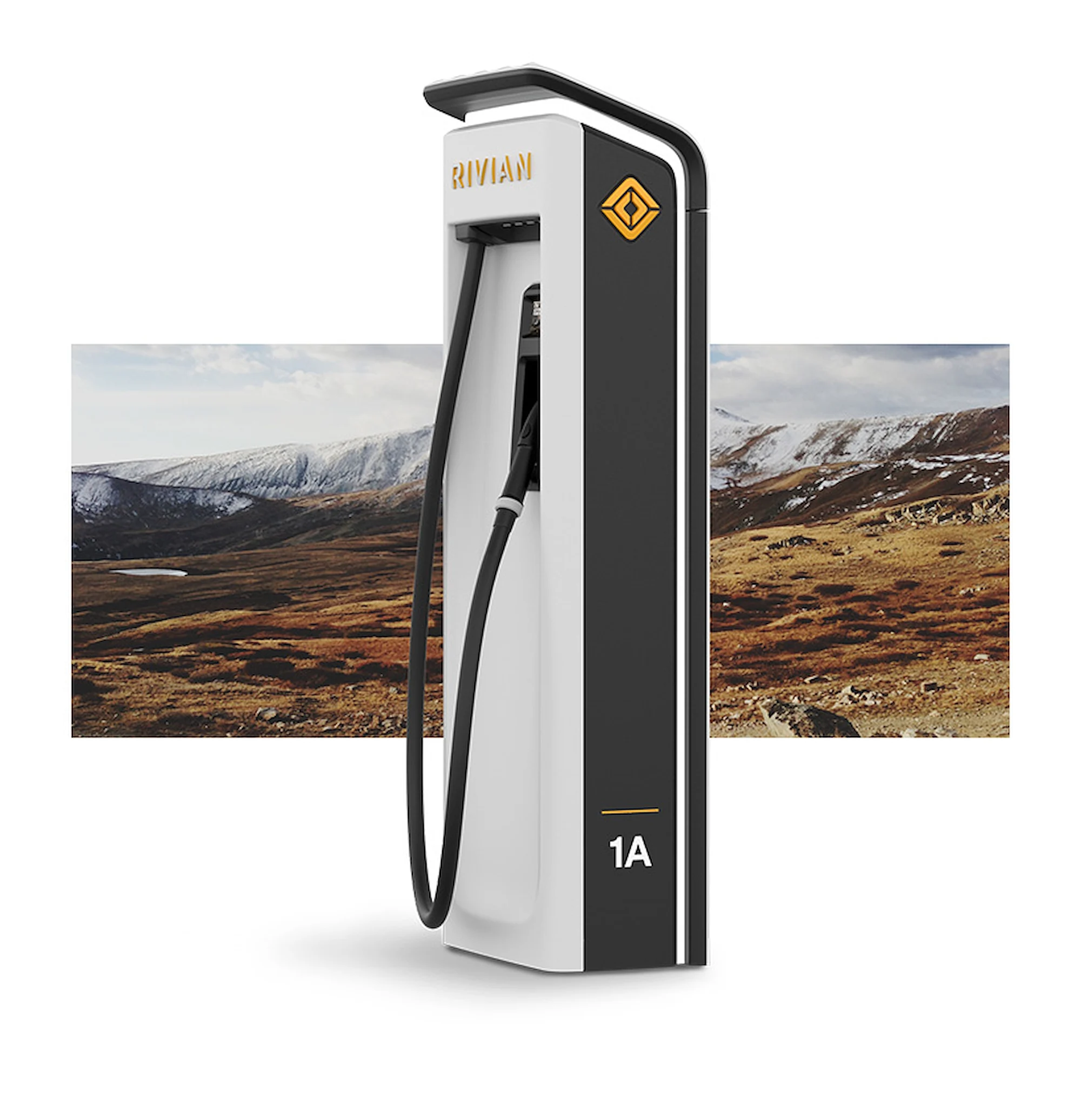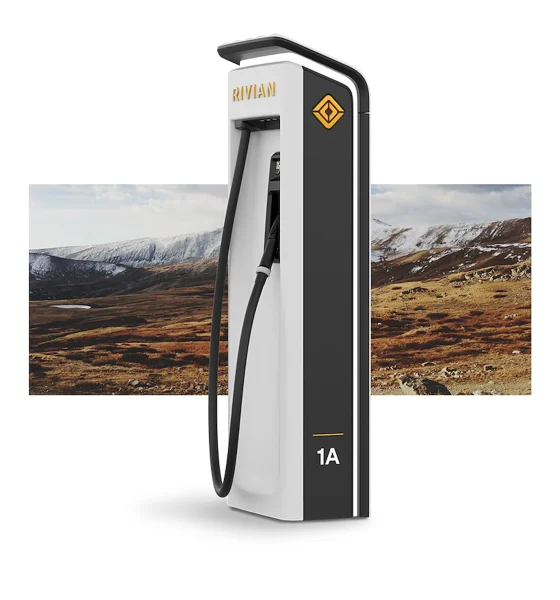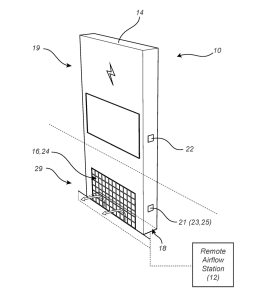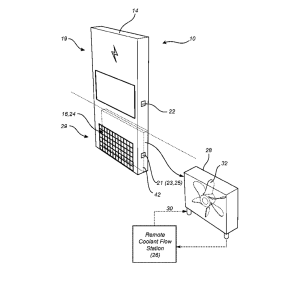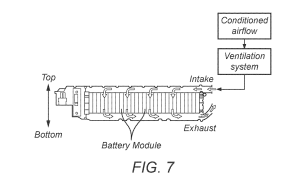Rivian has patented an air-conditioned EV charger that attempts to increase charging speeds by heating or cooling a vehicle’s battery during charging.
One hurdle in the way of unlocking faster charging for EVs is the problem of battery temperature. As an EV’s battery charges, particularly at high amperages, it begins to heat up, and to maintain a safe operating temperature, the charging station lowers its power output to allow the battery to cool. To battle this power throttling problem, Rivian has patented a system that could allow a charger to help heat or cool a battery in conjunction with the vehicle, depending on the ambient conditions.
According to Rivian’s patent, the air conditioning system would be built into the charging station and could heat or cool the battery, depending on the ambient temperature. Simply by blowing hot or cool air on the battery, aiding it in maintaining a stable operating temperature, Rivian believes that charging speeds can increase, battery longevity can be maintained, and fire risk while charging can be reduced, all while charging at incredibly high wattages.
Best of all, this system could easily integrate into any of Rivian’s current vehicles because it requires no physical alteration of the battery temperature management system. As seen in the diagram below, the vehicle’s battery management system would work to maintain the battery’s internal temp, but instead of taking in only outside air, the air being pushed underneath the truck would be pre-conditioned by the charger.
- Credit: Rivian Patent
- Credit: Rivian Patent
- Credit: Rivian Patent
As stated in the Rivian patent, this innovation was brought about by the rapid increase in charging power over the past 5-10 years regarding electric vehicles, “With the rapid advance of fast charging technologies for vehicles, the cooling demand of batteries during charging has increased dramatically…”
Rivian doesn’t specify how much faster this could make charging their trucks. However, considering the jump from non-conditioned batteries that were available in the early Nissan Leafs to the charging speeds capable in most modern EVs, this jump could be equally as impressive.
As companies look to give drivers increasingly faster charging speeds on their new electric vehicles, devices like the one patented by Rivian may become necessary. Not only would it allow for higher charging wattages, but drivers could charge faster, more safely, and without risking the longevity of their current battery. Hopefully, innovations like this will become real offerings sooner rather than later.
What do you think of the article? Do you have any comments, questions, or concerns? Shoot me an email at william@teslarati.com. You can also reach me on Twitter @WilliamWritin. If you have news tips, email us at tips@teslarati.com!

News
Tesla Model Y lineup expansion signals an uncomfortable reality for consumers
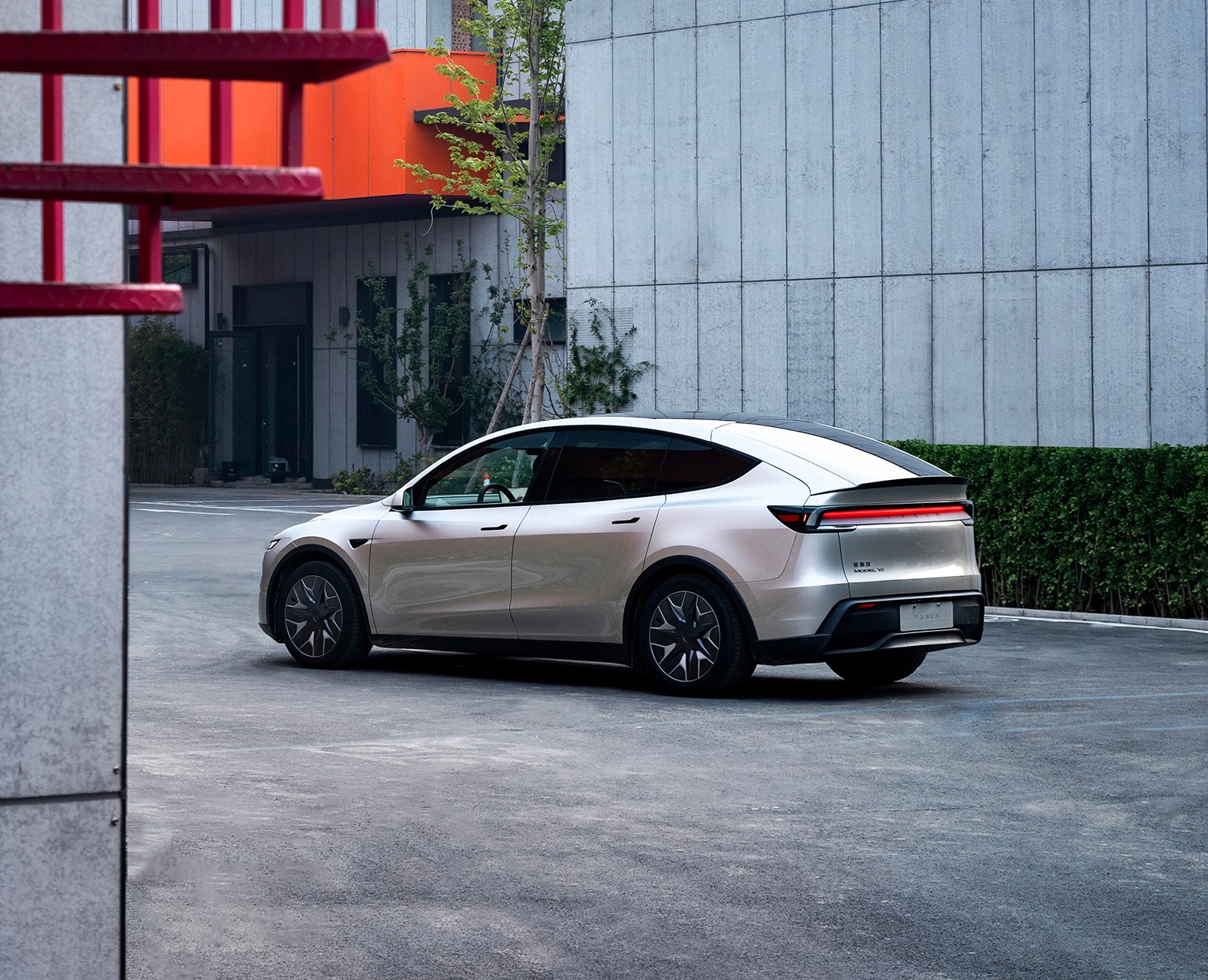
Tesla launched a new configuration of the Model Y this week, bringing more complexity to its lineup of the vehicle and adding a new, lower entry point for those who require an All-Wheel-Drive car.
However, the broadening of the Model Y lineup in the United States could signal a somewhat uncomfortable reality for Tesla fans and car buyers, who have been vocal about their desire for a larger, full-size SUV.
Tesla has essentially moved in the opposite direction through its closure of the Model X and its continuing expansion of a vehicle that fits the bill for many, but not all.
Tesla brings closure to Model Y moniker with launch of new trim level
While CEO Elon Musk has said that there is the potential for the Model Y L, a longer wheelbase configuration of the vehicle, to enter the U.S. market late this year, it is not a guarantee.
Instead, Tesla has prioritized the need to develop vehicles and trim levels that cater to the future rollout of the Robotaxi ride-hailing service and a fully autonomous future.
But the company could be missing out on a massive opportunity, as SUVs are a widely popular body style in the U.S., especially for families, as the tighter confines of compact SUVs do not support the needs of a large family.
Although there are other companies out there that manufacture this body style, many are interested in sticking with Tesla because of the excellent self-driving platform, expansive charging infrastructure, and software performance the vehicles offer.
Additionally, the lack of variety from an aesthetic and feature standpoint has caused a bit of monotony throughout the Model Y lineup. Although Premium options are available, those three configurations only differ in terms of range and performance, at least for the most part, and the differences are not substantial.
Minor Expansions of the Model Y Fail to Address Family Needs for Space
Offering similar trim levels with slight differences to cater to each consumer’s needs is important. However, these vehicles keep a constant: cargo space and seating capacity.
Larger families need something that would compete with vehicles like the Chevrolet Tahoe, Ford Expedition, or Cadillac Escalade, and while the Model X was its largest offering, that is going away.
Tesla could fix this issue partially with the rollout of the Model Y L in the U.S., but only if it plans to continue offering various Model Y vehicles and expanding on its offerings with that car specifically. There have been hints toward a Cyber-inspired SUV in the past, but those hints do not seem to be a drastic focus of the company, given its autonomy mission.
Model Y Expansion Doesn’t Boost Performance, Value, or Space
You can throw all the different badges, powertrains, and range ratings on the same vehicle, it does not mean it’s going to sell better. The Model Y was already the best-selling vehicle in the world on several occasions. Adding more configurations seems to be milking it.
The true need of people, especially now that the Model X is going away, is going to be space. What vehicle fits the bill of a growing family, or one that has already outgrown the Model Y?
Not Expanding the Lineup with a New Vehicle Could Be a Missed Opportunity
The U.S. is the world’s largest market for three-row SUVs, yet Tesla’s focus on tweaking the existing Model Y ignores this. This could potentially result in the Osborne Effect, as sales of current models without capturing new customers who need more seating and versatility.
Expansions of the current Model Y offerings risk adding production complexity without addressing core demands, and given that the Model Y L is already being produced in China, it seems like it would be a reasonable decision to build a similar line in Texas.
Listening to consumers means introducing either the Model Y L here, or bringing a new, modern design to the lineup in the form of a full-size SUV.
Elon Musk
Elon Musk reiterates Tesla Optimus’ most sci-fi potential yet
Musk shared his comments in a series of posts on social media platform X.
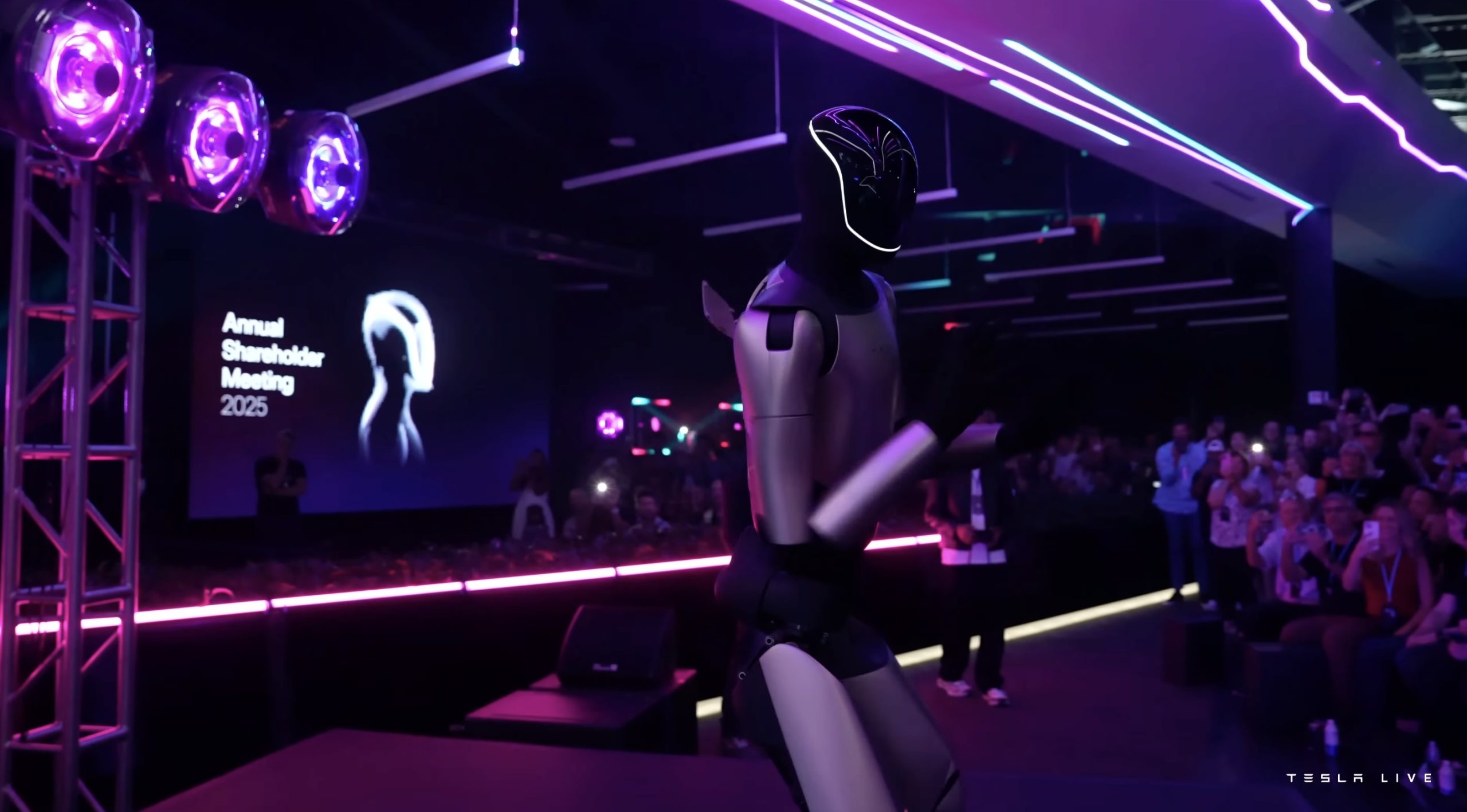
Elon Musk recently reiterated one of the most ambitious forecasts for Tesla’s humanoid robot, Optimus, stating it could become the first real-world example of a Von Neumann machine. He also noted once more that Optimus would be Tesla’s biggest product.
Musk shared his comments in a series of posts on social media platform X.
Optimus as a von Neumann machine
In response to a post on X that pondered on sci-fi timelines becoming real, Musk wrote that “Optimus will be the first Von Neumann machine, capable of building civilization by itself on any viable planet.” In a separate post, Musk wrote that Optimus will be Tesla’s “biggest product ever,” a phrase he has used in the past to describe the humanoid robot’s importance to the electric vehicle maker.
A Von Neumann machine is a class of theoretical self-replicating systems originally proposed in the mid-20th century by the mathematician John von Neumann. In his concept, von Neumann described machines that could travel to other worlds, use local materials to create copies of themselves, and carry out large-scale tasks without outside intervention.
Elon Musk’s broader plans
Considering Musk’s comments, it appears that Optimus would eventually be capable of performing complex work autonomously in environments beyond Earth. If Optimus could achieve such a feat, it could very well unlock humanity’s capability to explore locations beyond Earth. The idea of space exploration becomes more than feasible.
Elon Musk has discussed space-based AI compute, large-scale robotic production, and the role of SpaceX’s Starship in transporting hardware and materials to other planets. While Musk did not detail how Optimus would fit with SpaceX’s exploration activities, his Von Neumann machine comments suggest he is looking at Tesla’s robotics as part of a potential interplanetary ecosystem.
News
Tesla China January wholesale sales rise 9% year-on-year
Tesla reported January wholesale sales of 69,129 China-made vehicles, as per data released by the China Passenger Car Association.
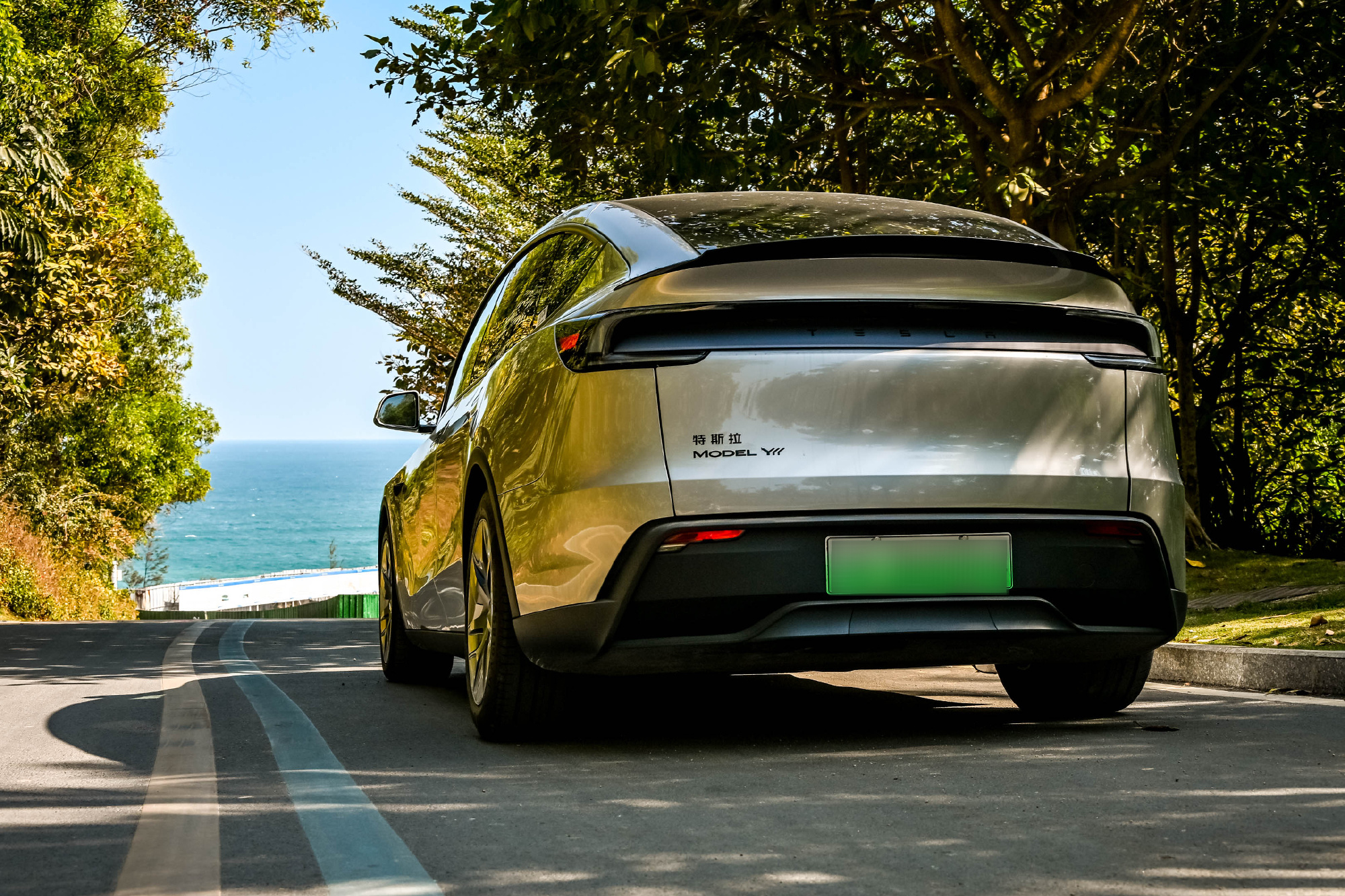
Tesla China reported January wholesale sales of 69,129 Giga Shanghai-made vehicles, as per data released by the China Passenger Car Association (CPCA). The figure includes both domestic sales and exports from Gigafactory Shanghai.
The total represented a 9.32% increase from January last year but a 28.86% decline from December’s 97,171 units.
China EV market trends
The CPCA estimated that China’s passenger new energy vehicle wholesale volume reached about 900,000 units in January, up 1% year-on-year but down 42% from December. Demand has been pressured by the start-of-year slow season, a 5% additional purchase tax cost, and uncertainty around the transition of vehicle trade-in subsidies, as noted in a report from CNEV Post.
Market leader BYD sold 210,051 NEVs in January, down 30.11% year-on-year and 50.04% month-on-month, as per data released on February 1. Tesla China’s year-over-year growth then is quite interesting, as the company’s vehicles seem to be selling very well despite headwinds in the market.
Tesla China’s strategies
To counter weaker seasonal demand, Tesla China launched a low-interest financing program on January 6, offering up to seven-year terms on select produced vehicles. The move marked the first time an automaker offered financing of that length in the Chinese market.
Several rivals, including Xiaomi, Li Auto, XPeng, and NIO, later introduced similar incentives. Tesla China then further increased promotions on January 26 by reinstating insurance subsidies for the Model 3 sedan. The CPCA is expected to release Tesla’s China retail sales and export breakdown later this month.
